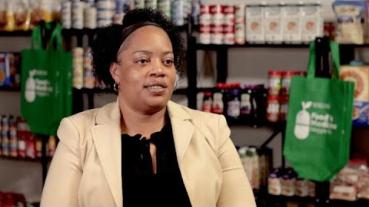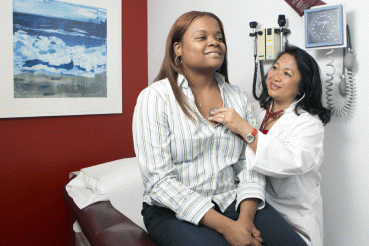The Aldi supermarket on Madison Street in West Garfield Park was a community mainstay for more than 25 years, providing fresh produce and a full selection of groceries at affordable prices. That all changed in October, when the store shut down suddenly. Rush and many community partners have come together to protest the closure and provide food for local residents.
Access to food is a human right
Food insecurity — or not having access to enough affordable, nutritious food — is an issue for many residents of Chicago’s West Side. According to the Chicago Food Equity Agenda, 19% of people in the Chicago metro region are food insecure. That figure rises to 29% in majority-Latinx communities and 37% in majority-Black communities.
Rush’s work to eliminate food insecurity is part of its commitment to helping people achieve and maintain good health. That can be difficult without access to basic needs like safe places to live, quality education, living-wage jobs and healthy food to eat.
“People have a right to be healthy, and access to healthy food is a basic human right,” said Julia Bassett, manager of health and community benefit at Rush. “That access shouldn’t be based on your ZIP code or on your financial situation.” In West Garfield Park, where the population is 93% Black, life expectancy is the lowest on the West Side: just 69 years, compared to 85 years in Chicago’s Loop, where the population is nearly two-thirds white.
When Aldi closed, it left West Garfield Park’s 16,000 residents with just one grocery store in the neighborhood. Rush took quick action with community partners West Side United and the Garfield Park Rite To Wellness Collaborative (GPRWC).
Teaming up to feed hundreds
To meet the community’s immediate needs, GPRWC organized food distribution events at the former Aldi location. They’re modeled on events Rush held during the COVID-19 pandemic to feed more than 20,000 West Side residents.
On Nov. 6 and 13, volunteers, including many from Rush University and the Rush Office of Community Health Equity and Engagement, handed out more than 250 boxes of free produce and meat to local residents. Additional distributions are scheduled for Nov. 19, Dec. 4, Dec. 11 and Dec. 18. And a special pre-Thanksgiving event, providing two weeks’ worth of food, will take place Friday, Nov. 19, at New Mt. Pilgrim Missionary Baptist Church, 4301 W. Washington Blvd.
To raise awareness and tackle food insecurity in West Garfield Park for the long term, New Mt. Pilgrim congregants and fellow neighborhood residents gathered with Rush employees and students and other community partners at Aldi’s North Side Chicago offices on Oct. 28 to protest the closing. Food is medicine, protester and Rush Medical College student Marissa Pharos explained to the Chicago Sun-Times.
“If [people] have heart disease, for example, part of [their] treatment is healthy eating,” she said. “It’s cutting back on sodium, it’s cutting back on that fast food. You can’t do that if you cannot find a grocery store that provides healthy food. So this doesn’t just impact the community as far as finding food, it impacts their health long term.”
The coalition is also working with the Garfield Park Community Council to lobby Aldi to give its building to the community so a new grocery store can take over the space and help fill the need for fresh, healthy food. Working with the 28th Ward alderman, the group hopes to get the city to provide incentives for a new grocer.
“Aldi left this community in the middle of the night without warning or regard that they have left a food desert more deserted,” Rev. Marshall Hatch Sr. of New Mt. Pilgrim told the Chicago Defender. “The store was clearly profitable and patronized, and Aldi’s corporate behavior in this era of racial reckoning is reprehensible, [and] must be called out and made right.”




